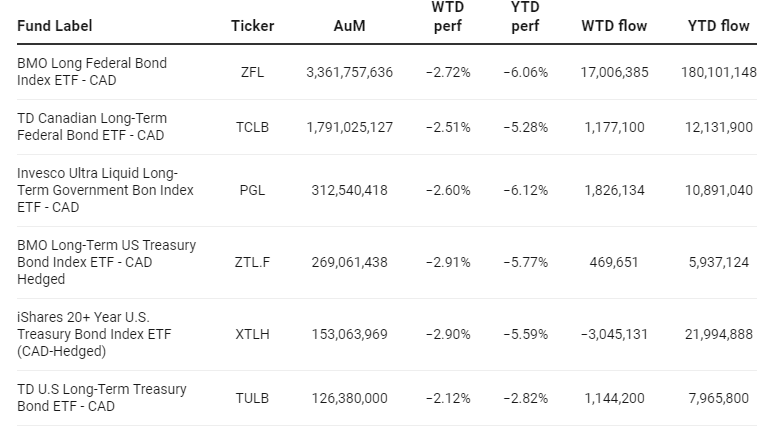The financial sphere witnessed a significant transformation this week due to a considerable surge in Treasury yields. To illustrate, there was an increase from 4.09 to 4.31 in the benchmark 10-year U.S. Treasury yield, indicating a rise of 22 basis points over the week.
This escalation primarily resulted from unanticipated inflation data with February's U.S. producer price index showing a month-on-month growth of 0.6%, double than what was projected at 0.3%. This sudden inflation spike has influenced various financial assets and had notable effects on high-duration fixed-income instruments and interest rate-sensitive equities like those related to real estate.
Impact on ETFs Amidst Escalating Treasury Yields?
ETFs reacted differently to these changes; overall, there was a slight downward trend for fixed-income asset class ETFs with an aggregate loss of about 0.84% over the week observed. However, more detailed analysis shows that long-term government bond ETFs experienced greater falls as they registered a weekly decline of around 2.91%. This highlights how rising yields directly affect long-duration debt instrument performance negatively.
Focus on ZFL and TCLB ETFs
Two prominent ETF examples reflecting this pattern are the BMO (TSX:BMO) Long Federal Bond Index ETF (ZFL) and the TD (TSX:TD) Canadian Long Term Federal Bond ETF (TCLB). The ZFL suffered nearly identical losses as its broader segment with its $3.3 billion assets under management sliding down by approximately 2.72%. Similarly, the TCLB was also impacted with a drop of -2.51%.
Group Data:

Index Data:

Funds Specific Data:
Which stock to consider in your next trade?
AI computing powers are changing the Canadian stock market. Investing.com’s ProPicks AI are winning stock portfolios chosen by our advanced AI for Canada, the US, and other exciting markets around the globe. Our top strategy, Tech Titans, nearly doubled the S&P 500 in 2024 - one of the most bullish years in history. And Beat the TSX, designed for broad market exposure, is showing +878% gains with 10 years’ back-tested performance. Which Canadian stock will be the next to soar?
Unlock ProPicks AI
